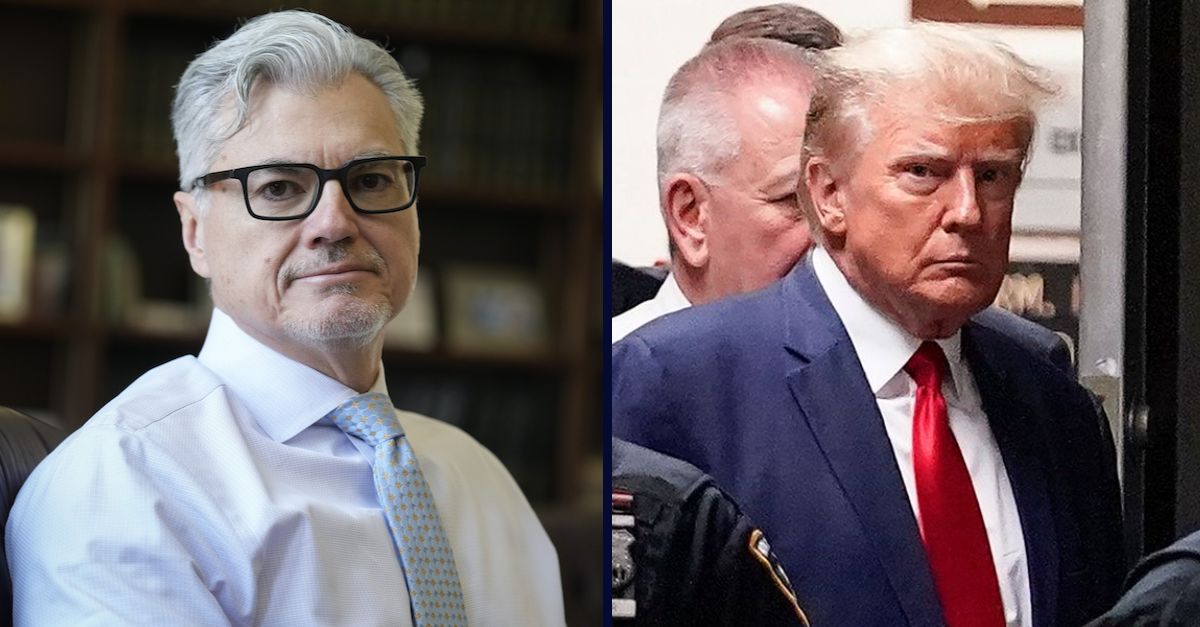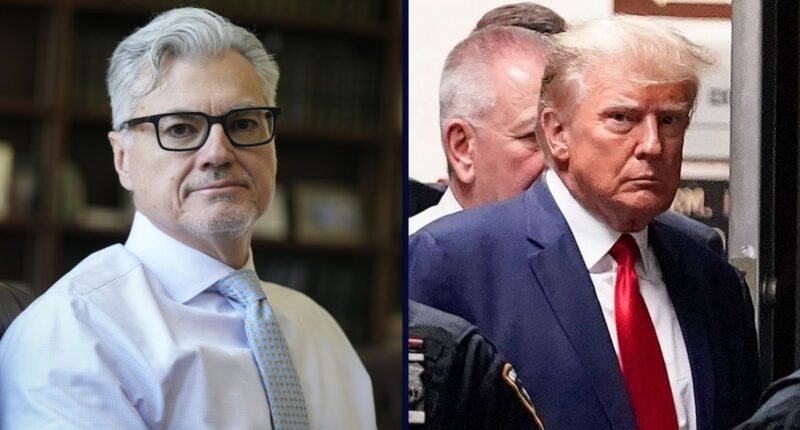
Left: Judge Juan Merchan is photographed in his New York chambers on Thursday, March 14, 2024. He is overseeing Donald Trump’s hush money trial there (AP Photo/Seth Wenig). Right: FILE – Former President Donald Trump is escorted into a courtroom on April 4, 2023, in New York (AP Photo/Mary Altaffer, File).
The U.S. Supreme Court has rejected a bid to lift the gag order barring Donald Trump from making public statements about officials involved in the New York criminal hush-money case that saw the president-elect convicted on dozens of felony charges.
In a Monday order, the high court declined an application that sought to appeal the gag order set by Acting New York Supreme Court Justice Juan Merchan
“The application for stay addressed to Justice [Samuel] Alito and referred to the Court is denied,” the order list said. There were no additional comments or explanations from the justices.
During the criminal trial, Merchan, the presiding judge, prohibited Trump from speaking about witnesses, prosecutors, jurors, or court staffers and their family members.
On March 27, the day after Merchan issued the order, Trump used a Truth Social media post to criticize the judge, his daughter, and Manhattan District Attorney Alvin Bragg. On March 28, the 45th president leveled several more similar rhetorical jabs.
On March 29, Bragg’s office filed a letter categorizing the defendant’s posts targeting the judge’s daughter as “contumacious” and asking Merchan to “clarify or confirm that the Order protects family members of the Court.” Trump defense attorney Todd Blanche quickly fired back, arguing the state was trying to “expand” the order and that “there was nothing ‘contumacious’ about the social media posts.
By early April, the gag order had been expanded to cover the family members of any participants to the proceedings — a pointed judicial rejoinder to Trump’s criticism of Merchan’s daughter over her political consulting work for the Democratic Party.
On May 30, a jury found Trump guilty on 34 felony counts of falsifying business records involving the hush-money payments made to adult film actress Stormy Daniels prior to the 2016 presidential election.
In June, the New York Court of Appeals first rejected a Trump appeal to lift the gag order in his hush-money case. The defense responded by mounting yet another appeal, bringing their complaints about acting Merchan to the New York Supreme Court’s Appellate Division, First Department.
A unanimous denial followed in August, as the court defended Merchan’s “narrowly tailored protections,” concluding that the judge “did not act in excess of jurisdiction” when he ordered Trump to “refrain” from “making or directing others to make public statements” about “family members of any counsel, staff member, the Court or the District Attorney, if those statements are made with the intent to materially interfere with, or cause others to materially interfere” with their work.
The appellate court, agreeing that there was evidence of ongoing threats to Manhattan DA Alvin Bragg’s staff, called Trump’s position “unavailing,” since courts are “empowered to protect against the ‘unfair administration of justice”” until sentencing or “some other final disposition” takes place.
“Contrary to petitioner’s contentions, the People’s evidentiary submissions in opposition to his motion in Supreme Court demonstrate that threats received by District Attorney staff after the jury verdict continued to pose a significant and imminent threat,” the appellate division said.
In September, the New York Court of Appeals again rejected Trump’s appeal without much of an explanation other than a line saying there was “no substantial constitutional question” directly involved in his petition.
Trump and his allies have long argued, without success, that the gag order runs afoul of the First Amendment.
Despite Trump being found guilty of felony conduct, Merchan has delayed his sentencing hearing in light of Trump winning the 2024 presidential election. Trump has sought to have the case and his convictions dismissed. Bragg’s office is required to file a motion on Monday explaining why Trump’s convictions should stand. His office has previously indicated that Trump’s sentencing could remain on hold until after he leaves office in 2029.








